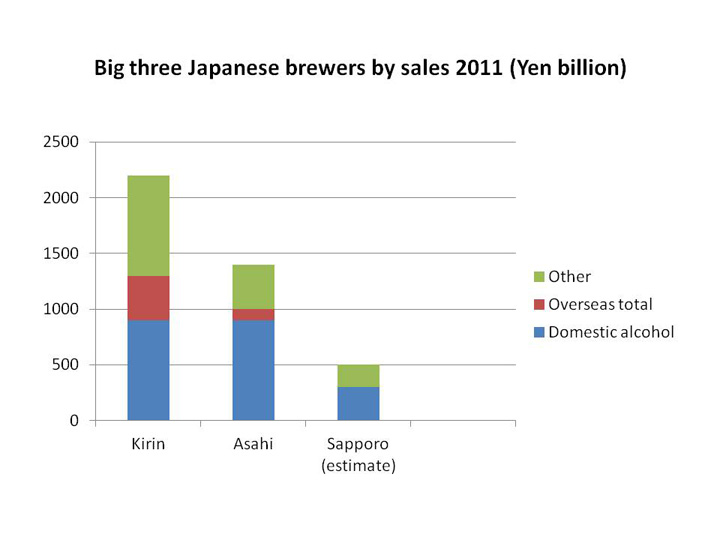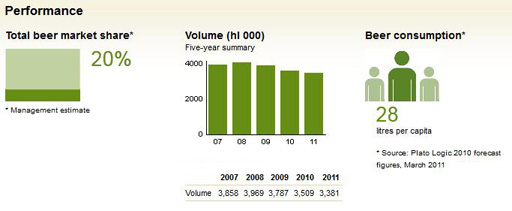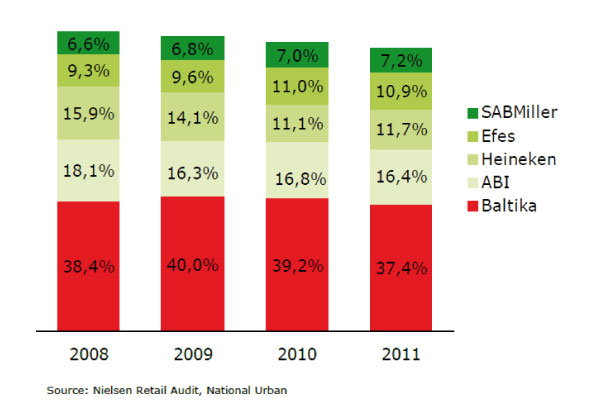They have had Sam Adams contract-brewed in the U.S. for decades, so why not have it produced under licence abroad? In February 2012, U.S. craft brewer Boston Beer said that Kent-based Shepherd Neame will now be producing the beer after having previously served as their importer into the UK.
Italy, the eurozone’s third-largest economy is in recession and prime minister Mario Monti predicted worse to come. What do brewers do in times of economic crisis? Change executives. Roberto Jarrín, 46, is the new CEO of Birra Peroni, the Italian subsidiary of SABMiller Group.
Brewers in Russia can expect another two years of disruption as the beer market adjusts to recent sales restrictions, Fitch Ratings agency reported in early February 2012. Wouldn’t Carlsberg know? The world’s number four brewer has long been looking for a way to reverse the steady decline in sales from its Russian market, which has been hit by a combination of spiralling taxes designed to curb alcoholism and intense competition.
Reporting season may be upon us, but who can really work up an interest in Big Beer’s profits going up or down while colourful Czech politicians are busy writing yet another cliff-hanger in the never-ending Budweiser saga?
Carlsberg on 20 February 2012 announced that it will spend up to DKK 4.4 billion (USD 785 million) to buy the rest of Baltika’s shares which it does not own already to swing its ailing Russian business back to growth. Currently, Carlsberg holds an 85 percent stake in Russia’s Baltika brewery. Carlsberg will then delist the company.
They have been saying this for years. That they are seeking growth in Asia through acquisitions to offset sluggish business in Europe. But repeating this strategy over and over again does not make it any more real. Where are the acquisitions that could get Carlsberg out of its current fix?
"Russia is a very difficult market. ... I am not so sure about the growth potential of the next year, which might be minute or slightly decreasing", Heineken CEO Jean-François van Boxmeer said on 15 February 2012, when commenting on the brewer’s 2011 full year figures. And true: central and eastern Europe was the only market where Heineken saw revenue growth of 5 percent yet profits drop 7.2 percent (EBIT).
Who would have thought: while Budweiser Budvar's CEO and the Czech Minister for Agriculture continue with their public slugfest, several parties, including brewers Heineken, AB-InBev, Carlsberg, SABMiller, Molson Coors, Asahi as well as private-equity outfits, are rumoured to be interested in taking over the central European brewer StarBev, also headquartered in the Czech Republic. The Wall Street Journal broke the news on 22 February 2012.
Growth in the world beer market picked up to reach 2.7 percent in 2011, thanks to increased beer consumption in emerging markets, industry research group Plato Logic reported on 8 February 2012.
In the recent spat with Petr Bendl, the Minister of Agriculture, Budweiser Budvar’s Jiří Boček may have won a round – but not the fight. The long-time manager of state-owned brewery Budějovický Budvar (Budweiser Budvar) cleverly played the political card – Budweiser Budvar falling into the hands of Anheuser-Busch if it were to be privatised – to fend off criticism of his managerial style.




